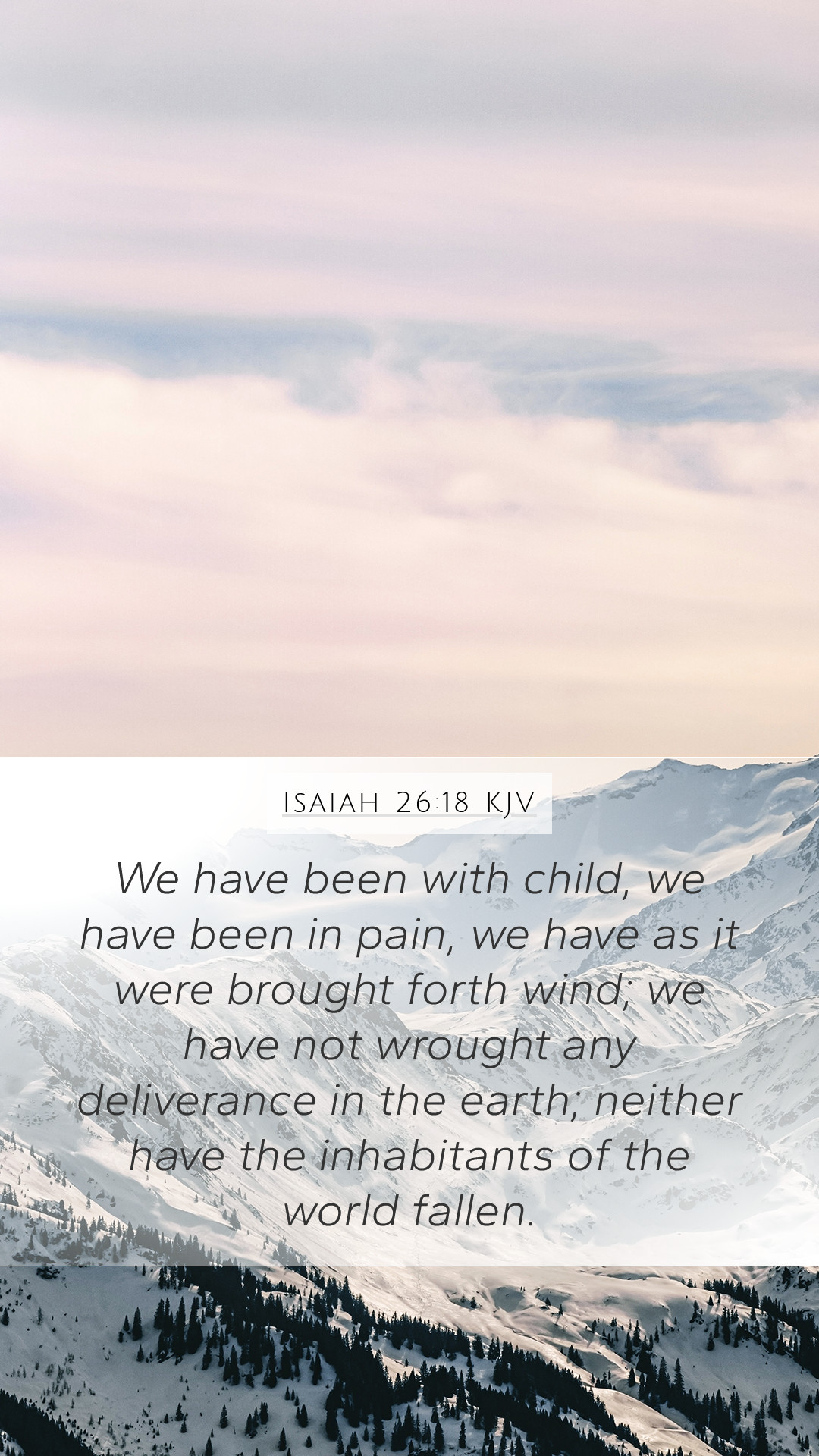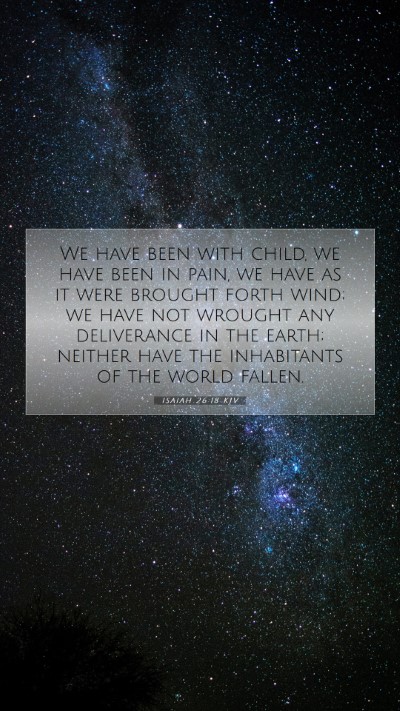Understanding Isaiah 26:18 - A Comprehensive Bible Verse Commentary
Isaiah 26:18 states: "We have been with child, we have been in pain, we have as it were brought forth wind; we have not wrought any deliverance in the earth; neither have the inhabitants of the world fallen."
Overview of the Verse
This verse expresses a profound sense of disappointment and frustration. The imagery of childbirth is used to convey the struggle and effort exerted by the people of Israel, contrasted with the ultimate empty outcome—bearing "wind" instead of fruit. It reflects on their failures to achieve any tangible deliverance for themselves or to impact the world positively.
Commentary Insights
The following insights are synthesized from well-respected public domain commentaries, including Matthew Henry, Albert Barnes, and Adam Clarke.
Matthew Henry's Commentary
Henry emphasizes the metaphor of childbirth, explaining that just as a mother endures the pains of labor to bring forth new life, so too have the people of Israel experienced great anguish in their spiritual struggles. However, despite all their efforts and exertions, they find themselves yielding nothing of substance—no deliverance from oppression or sin, only emptiness. Henry suggests that this serves as a reflection on the spiritual condition of Israel, highlighting their need for true redemption only found in God.
Albert Barnes' Commentary
Barnes discusses the grief expressed in this verse, reflecting upon the futility felt by the exiled Israelites. He notes that the "wind" symbolizes uselessness and disappointment. Despite their longing for spiritual rebirth and redemption, they find themselves in a state of despair without results. Barnes illustrates that this verse is also a reminder of the divine plan for Israel, hinting at the forthcoming deliverance that would stem from a reliance on God rather than their own works.
Adam Clarke's Commentary
Clarke elaborates on the historical context surrounding this verse, suggesting that it portrays the plight of the Jewish people during their time of captivity and reflects their spiritual barrenness. He underscores the theme of reliance on human strength versus divine assistance. Clarke points out that true deliverance will come only through God's intervention, reinforcing the necessity for turning towards Him in faith and obedience.
Thematic Interpretations
- Spiritual Barrenness: The imagery of 'bringing forth wind' epitomizes a lack of spiritual fruitfulness amidst significant struggles.
- Divine Deliverance: The verse underscores the acknowledgment of human inability, leading to the understanding that ultimate deliverance must come from God.
- Human Effort vs. Divine Purpose: The contrast between the people's exertions and the lack of results highlights the futility of relying solely on human endeavors for salvation.
- Hope in Despair: While the verse encapsulates despair, it ultimately prompts readers to seek hope and deliverance through faith.
Application in Modern Context
Isaiah 26:18 encourages believers to reflect on their personal and communal quests for spiritual renewal. In times of hardship, it reminds them that while they may toil and struggle, it is vital to rely on God's wisdom and strength for true transformation and deliverance. This verse serves as a powerful reminder for individuals and Bible study groups engaged in online Bible study or utilizing Bible study resources to understand the importance of divine intervention in their lives.
Cross References
- Isaiah 53:4-5 - The suffering servant bearing our griefs.
- Jeremiah 4:31 - The anguish of a nation in turmoil.
- Romans 8:22-23 - The groaning of creation awaiting redemption.
- Psalms 126:5-6 - Those who sow in tears will reap with joy.
- Matthew 11:28-30 - Jesus offering rest to the weary.
Conclusion
The complexities surrounding Isaiah 26:18 invite in-depth exploration and rich discussion. By engaging with this verse through various Bible study tools and Bible study guides, individuals can uncover profound meanings essential to their faith journey. It highlights the necessity of understanding Scripture within its context, revealing deeper truths about the human condition and divine salvation.
Further Study
For those looking to expand their understanding, consider engaging with Bible study courses focusing on issues of despair, hope, and reliance on God, as well as participating in Bible study lessons that further explore the themes found in Isaiah and throughout Scripture.


